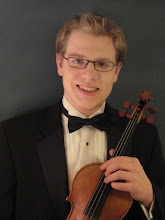Music is a living thing. It breathes in silences. It eats and drinks the sounds that give it substance. It communicates with whatever audience might be willing to listen to it. Notes flow through phrases and into lines like blood flows through veins.
Although this might be an extreme way to look at music, it can be helpful in order to understand the subtleties of music. I've noticed lately how difficult it is for some musicians to understand the difference between a rest in the music and a breath, or between a moving of the phrase and a crescendo or an accelerando. But there is no denying the differences. For example, many musicians may have heard their teachers talk about the front and back ends of the beat. When one plays on the front end of the beat, you aren't necessarily speeding up the tempo, you are simply creating an idea of restlessness and movement in the music. Similarly, when you play on the back part of the beat, you aren't slowing down the tempo, but instead creating a downward, lagging feeling in the music.
Another, more complicated example would be creating a phrase going to a certain point. The minute a teacher says to not let the phrase die, many students will simply get faster and get louder in order to achieve the effect. Unfortunately, this ends up sounding exaggerated and overdone. Instead, it would be better to keep a more sustained sound that keeps one note going to the next without a break in the phrase. As far as dynamics are concerned, many musicians have a tendency to not keep any swings that flow with the phrase within the dynamic written in the music. It is possible to have a variance without leaving that dynamic level, it simply has to be more subtle.
One final thing that often causes confusion is the term "breath." When we breathe during a phrase, sometimes we mistake this as a break, or a stop. But really, the term "breath" should be meant as more of a comma than a period, comparing a phrase to a sentence. The ringing of the sound should never stop, and neither should the motion of the bow (at least for string players), otherwise it will sound like the phrase itself dies, when the purpose of the breath is to make more sense of a long phrase.
Even though I'm talking all about how little things like pushing a phrase or breathing should be taken as more of subtleties than actual changes to the music, there are times when exaggeration is necessary. Music is not an always or never business, and sometimes exaggeration helps the phrase. But not always. I've noticed this in my own playing lately (the very reason why I'm writing this post): I tend to exaggerate EVERYTHING, when really I don't need to. It comes across as overbearing to the audience. This is something I think every musician (especially myself) struggles with at some point, if not all the time, and it helps to be aware of it.
-Phil
Subscribe to:
Post Comments (Atom)




No comments:
Post a Comment